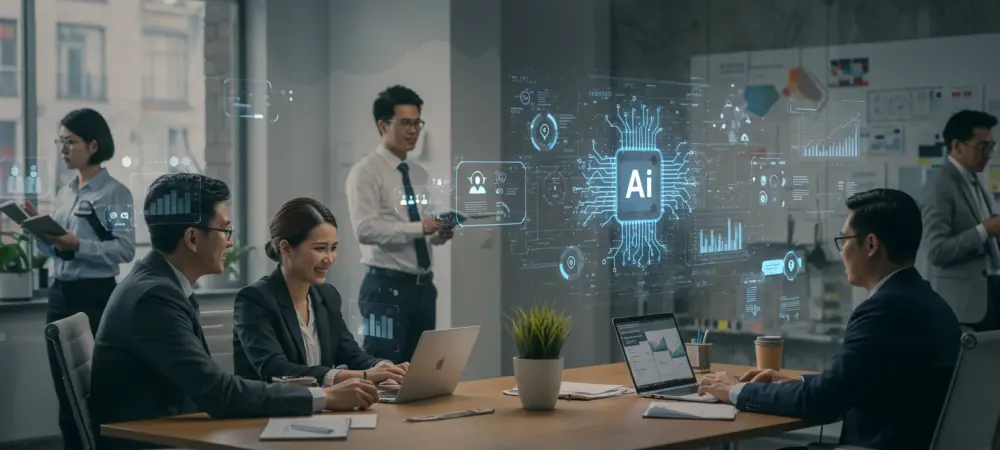Amidst an era where technology fuels significant transformation, artificial intelligence (AI) emerges as a powerhouse within the human resources (HR) domain. With businesses persistently seeking efficiencies, AI offers HR professionals a pathway to revolutionize recruitment, employee engagement, and analytics. However, amidst its potential, AI brings forth challenges such as skills gaps and data privacy concerns, which demand attention to unlock its full capabilities in HR.
Revolutionizing Recruitment with AI
AI-driven recruitment processes have found their footing in enhancing efficiency and effectiveness over traditional methods. By leveraging machine learning algorithms, AI can streamline the candidate screening process, minimizing biases and promoting diversity. These sophisticated algorithms analyze vast datasets to identify the most suitable candidates, significantly reducing time-to-hire and enhancing the quality of hires.
Exciting developments in AI recruitment tools include chatbots that interact with prospective candidates, providing immediate feedback and handling initial screenings. By offering a seamless candidate experience, these technologies elevate the organization’s brand image, attracting top talent. Consequently, AI’s role in recruitment has shifted HR from a support function to a strategic partner, aligning hiring processes with the company’s overarching goals.
Elevating Employee Experiences Through AI
Beyond recruitment, AI also holds promise in optimizing employee experiences, shaping an adaptive work environment that addresses individual needs. AI enables personalized learning and development plans by analyzing employee performance data against organizational benchmarks. This tailored approach ensures that employees are equipped with necessary skills, fostering a culture of continuous growth and engagement.
Predictive analytics, another facet of AI, allows HR teams to anticipate workforce trends and proactively address employee concerns. By understanding potential attrition indicators, organizations can mitigate turnover rates and enhance talent retention strategies. Through these applications, AI shifts HR from reactive problem-solving toward proactive people management, thus fostering a more supportive and fulfilling workplace.
Unveiling Recent Innovations in HR AI
The AI landscape in HR continues to evolve, with recent innovations reshaping industry practices and expectations. Advances in natural language processing (NLP) are enabling smarter interactions and more insightful sentiment analysis, offering deeper understanding of employee concerns and motivations. These insights inform data-driven decisions about company culture and management practices, staying attuned to employee needs.
Meanwhile, AI-powered platforms that seamlessly integrate HR functionalities are gaining traction. These systems not only consolidate disparate HR functions but also provide real-time analytics for informed decision-making. Such integrated systems push HR departments to become more quantitative and strategic, encouraging data-centric approaches that drive organizational performance improvements.
Real-World Deployments Across Industries
Across sectors, organizations continue to implement AI in diverse HR functions, leading to notable results. In the retail industry, AI assists in predictive scheduling, ensuring optimal staffing levels for fluctuating demands while also considering employee preferences. This leads to better work-life balance and morale, which in turn fuels productivity and customer satisfaction.
Similarly, in the healthcare sector, AI streamlines credential verification, reducing administrative bottlenecks and ensuring compliance with regulatory standards. This enhances onboarding efficiency and allows healthcare professionals to focus on patient care rather than procedural delays. These practical implementations highlight AI’s potential in addressing industry-specific challenges and optimizing HR processes.
Challenges in AI Adoption
Despite its promise, AI adoption within HR faces formidable challenges. A significant obstacle is the competence gap, as a notable percentage of HR professionals lack adequate AI-related skills. This gap hinders full utilization of AI tools, limiting their transformative potential. Investment in upskilling HR teams becomes crucial to bridging this chasm, allowing them to leverage AI confidently.
Data privacy concerns also loom large. Ensuring compliance with regulations necessitates robust data management strategies while balancing employee trust. Top organizations are investing in transparent AI decision-making processes to demystify algorithm outputs, promoting a culture where AI tools are not only accepted but trusted.
Projecting the Future of AI in HR
The trajectory of AI’s role in HR promises groundbreaking advancements, with predictive analytics poised to redefine workforce planning. AI’s ability to anticipate market shifts and workforce needs could reshape talent acquisition and management strategies, giving organizations a proactive edge. Emerging technologies like AI-driven virtual reality training modules hold potential to revolutionize employee development, providing immersive experiences that transcend conventional methods. These innovations, coupled with ongoing improvements in AI accuracy and transparency, herald a future where HR becomes increasingly strategic, data-informed, and employee-centric.
In conclusion, the promise of AI in HR is vast, tethered equally to advancements and challenges. Bridging the identified skills gap remains imperative to reaping AI’s full benefits. It is through targeted upskilling, mindful integration, and transparent practices that organizations can fully unleash AI’s transformative impact on HR, enriching workplaces and enhancing organizational performance.

